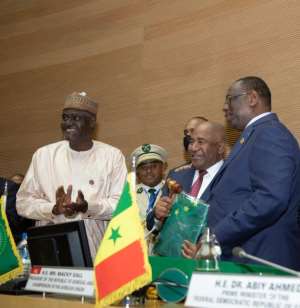
Africa has often been neglected by Western nations, yet the continent’s leaders have not fully embraced the need to address internal challenges. While significant issues persist across Africa, much of the West’s attention, notably from the US remains fixated on conflicts such as the Israel-Hamas war in the Middle East. Despite the longstanding conflict in Sudan predating the Israel-Hamas war, efforts to broker peace in the latter often overshadow endeavours to resolve Sudan’s turmoil, leading to continued civilian casualties and suffering, raising questions about the value placed on African lives compared to those in other regions.
The West’s hypocrisy has become increasingly apparent, particularly evident in its response to crises like the Sudanese conflict in 2003, where the primary concern seemed to be evacuating Western citizens, leaving Sudanese civilians vulnerable to the violence. This raises concerns about the moral compass guiding Western actions. Africa, boasting a youthful population crucial for the global workforce and abundant resources vital for global operations, deserves more proactive support from the West to overcome its challenges.
Failure to adjust Western attitudes towards Africa risks alienating other African nations, potentially leading them to sever ties with their Western partners, as seen with Niger, Mali, and Burkina Faso's shift towards Russia due to perceived neglect from France. Africa's diversity presents varying development levels, resources, and challenges across regions, necessitating tailored approaches to foster self-sufficiency and resilience.
Investments in education and innovation, exemplified by Rwanda, can empower African nations to harness human capital and technology for economic growth. Infrastructure development, like Ethiopia’s Grand Ethiopian Renaissance Dam, is pivotal for connectivity and job creation, while promoting renewable energy sources can reduce reliance on fossil fuels. Intra-African trade, facilitated by initiatives like the African Continental Free Trade Area (AfCFTA), fosters regional integration and resilience against global economic fluctuations.
Diversifying economies beyond traditional sectors, as seen in Botswana, can enhance resilience, with a focus on entrepreneurship and industries such as agriculture, manufacturing, tourism, and technology. Additionally, prioritizing good governance and anti-corruption measures, exemplified by Ghana's reforms, creates an enabling environment for sustainable development, attracting investment and ensuring equitable resource utilization.
In conclusion, Africa’s path to self-sufficiency and resilience requires concerted efforts from both African leaders and their Western counterparts, transcending historical neglect and embracing proactive collaboration to unlock the continent’s immense potential.
Richmond Acheampong is a communication specialist, consultant, independent journalist and columnist. He holds a PhD in Journalism. He can be contacted through +233240389154, +233550818739 or [email protected]




 Bryan Acheampong’s Rock City submitted the best proposal for our hotels – SSNIT ...
Bryan Acheampong’s Rock City submitted the best proposal for our hotels – SSNIT ...
 Petition to impeach Kissi Agyebeng: Martin Amidu has embarrassed us – Movement a...
Petition to impeach Kissi Agyebeng: Martin Amidu has embarrassed us – Movement a...
 President Akufo-Addo is safe – Presidency allays fears after accident involving ...
President Akufo-Addo is safe – Presidency allays fears after accident involving ...
 Bawumia is either joking or lying on his campaign tour; he can't be Ghana’s Pres...
Bawumia is either joking or lying on his campaign tour; he can't be Ghana’s Pres...
 ‘Invest in hospitals and stop wasting money on holes’ — Beatrice Annan to NPP go...
‘Invest in hospitals and stop wasting money on holes’ — Beatrice Annan to NPP go...
 5 ways I’ll build a stronger cedi with my GTP if elected president — Alan reveal...
5 ways I’ll build a stronger cedi with my GTP if elected president — Alan reveal...
 ‘We found no survivors’ — Iranian President confirmed dead after helicopter cras...
‘We found no survivors’ — Iranian President confirmed dead after helicopter cras...
 Opuni case: CJ's 'circumcision' of 3 judges 'fuels needless speculation' – Azar
Opuni case: CJ's 'circumcision' of 3 judges 'fuels needless speculation' – Azar
 Kissi Agyebeng’s removal will erode confidence in corruption fight — Dr Osae-Kwa...
Kissi Agyebeng’s removal will erode confidence in corruption fight — Dr Osae-Kwa...
 Iran’s President Raisi killed in helicopter crash, EU sends condolences
Iran’s President Raisi killed in helicopter crash, EU sends condolences
